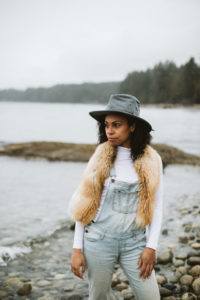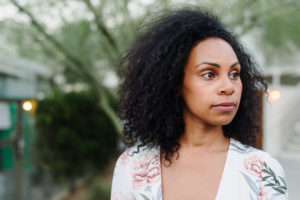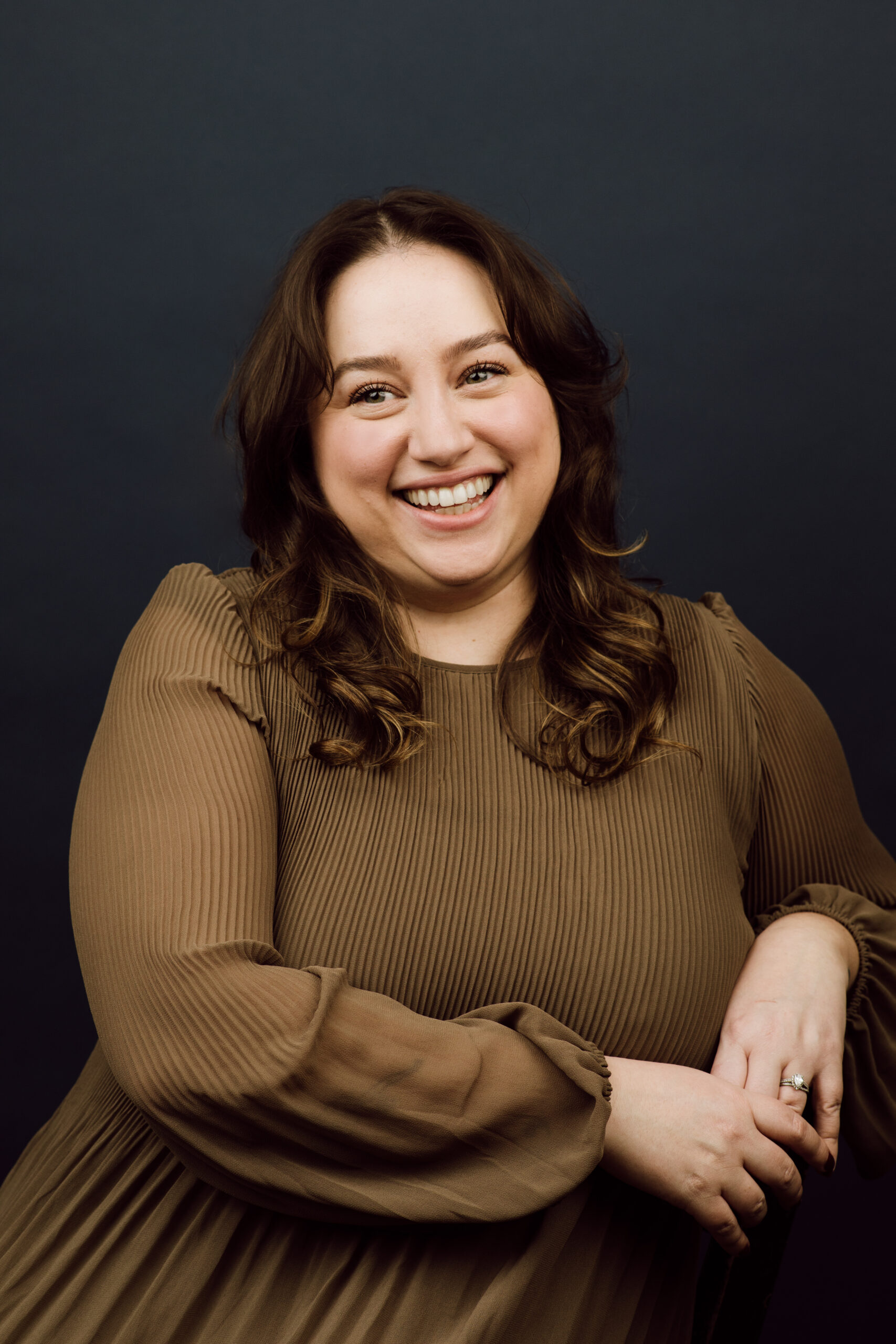Photo by Bethany Schiedel
By Brittany Tiplady
@yellowbird888
Ricketts walked into the Loose Lips office, right on time, carrying an abundance of energy that served as a prelude to how our interview would go: shit would get real. We began the interview making small talk about the perils of moving and renting in Vancouver, in-suite laundry, and how often you should wash your jeans. And then, we got to the good stuff.
I first listened to Rachel Ricketts speak at a town hall-type panel hosted by Tight Club back in March. She mesmerized me. Since sitting in on that evening, I’ve had her story on my radar; she’s the kind of woman you need to get to know and in the past six months, every time I stumbled on her Instagram page I said to myself: “I have to interview her.”
Ricketts is a Certified Death Doula, and a wealth of knowledge on the topic of (well, amongst many things), grief. Without being ostentatious she has cultivated her zone of genius into a space that is dedicated to supporting those in the process of grieving.
Whether it be through grief coaching via Skype, attending her retreats, or sitting in on her support groups, Ricketts has made help, hope, and space accessible.
Meet her brainchild, Loss&Found.
Q: I want to give our readers some introductory context to Loss&Found and what it’s all about.
Rachel: I feel like Loss&Found was brewing in me my whole life but it came to fruition after my mom died in October of 2015. It was a long and trying death because she chose to die and we moved her to a hospice. This was before assisted suicide was legal, and she ended up starving herself to death. It was a big, long, drawn-out fight to keep her pain free, and safe and secure during that process.
[In the process of my grief] I felt really strongly in my bones that I can’t be the only one that feels this way, and I can’t be the only one that has gone through this. I was searching online for resources, for guidance, and for support from people who would be in the same age group and have similar values and I didn’t find anything. And the support groups that I went to were amazing but they were mostly an older [demographic] that had maybe lost a spouse and that’s just a totally different experience. I’m in no way saying it’s better, or worse it’s just different. And when I’m talking about grief, I needed to swear my ass off, and I didn’t find anything that reflected me. Anywhere. So, I wanted to create that space.
Q: You assist people in their grieving process. Let’s talk more about the role of grief in your own life.
My mom was diagnosed with MS when I was 13 years old and a big part of my identity was wrapped up in being her caretaker. She was a single mom, and I’m an only child so it was only just the two of us. And then she died. And while I had so long to anticipate her death, because she had been sick essentially my whole life, and it wasn’t the kind that gets better, you gradually get worse and that’s it.
I always knew she was going to die long before I wanted her to and I think I thought that I had it together.
I had two simultaneous ideas: one that my mom is going to die and my whole world is going to fall apart while I was in a fetal position on the ground. Or, the other is that I’ve been leading up to this for so long, that maybe it won’t be the worst thing ever. And at first it wasn’t; I was in shock for quite some time and, because of the nature of her death, I was relieved. All she wanted was to die and I was happy that her wish came true. Then, three to six months later, it really hit me, and people didn’t understand, and society wanted me to be fine and not deal with me and what I was experiencing.
Sometimes I’d laugh, and sometimes shit would be okay. And fundamentally, things sometimes would be okay. But I was absolutely not fine at all and the contrast was really hard for me, and I felt all this external pressure.
Q: Is that what led to Loss&Found growing its legs?
Rachel: I wanted to create a space where I could write about this [process]. And not just all about me, I wanted a space for other people to be able to share. And then, over the course of the year leading up to the anniversary of my mom’s death I had so many people around me dealing with sick or dying or dead parents and family members and I felt like this collective experience was really acute. I was like, “Oh shit! People in my life need help right now.” I felt like I could help in some capacity.
So, I got certified as a death doula and started doing grief coaching and that’s what I have been up to ever since.
Q: Is Loss&Found a side hustle? Did you quit a job to get here?
Rachel: It’s a side hustle along with a day job that is soon coming to an end. I’m at the point that I am obviously very grateful for my job, and it’s amazing to feel financially comfortable enough to get this stuff done and actually help people in a way that I feel is best to help them not just the way is going to bring in income for me.
Now I’m at that point where I know this is my life’s work and I have to trust it enough to trust that the universe will support me in doing it.

Q: So, obviously I did my research and I read that you are a lawyer by trade. I want to know more about that corporate life transition into entrepreneurial life.
Rachel: So I still am a lawyer; that’s my day job. When my old firm went under, we had three weeks. And all the women in the firm were like: “is this what we really want to be doing?” I had to do some serious soul-searching. I now work from home, and I have one client, and it’s a lot better but it’s still not my life’s purpose.
Q: But, all that schooling!
Rachel: The thing is is that you can never un-lawyer. You can never un-think in that way. Come hell or high water, whether it serves you or not, you’ll always have that mindset. And, I know I can do fucking anything because I’ve been left out to dry with so many huge, scary, awful, things to do on my own. That’s what lawyers do: we are supposed to come at you as if we know everything, but really we know a small segment of information but we have an ability to find the answers and that’s what we are trained to too.
I came to the realization though, that I don’t love this job, and I don’t like this space that I am in, and I don’t like this career enough. And a lot of that has to do with being a woman, and being a woman of colour, in a male, patriarchal, misogynistic environment.

Q: I wanted to touch on that with you, but I didn’t want to ask that annoying, question.
Rachel: Oh, please do. I could talk about this until the cows come home. Because it doesn’t just apply to being a lawyer and that profession, but it is a particularily archaic, patriarchal career. Even walking through the halls of law schools and seeing all the grad photos from years prior and it is mostly white men. And slowly there would be maybe an Asian guy, and then a woman sprinkled in, and like no black people. And they tell you that now, law schools have more women than men, but the retention rate is fucking bullshit. Our class was actually fairly diverse but I would be intrigued to see who was still practicing.
Q: In talking about being your moms caretaker, and friend, and daughter, and life-go-to-person, how did you find the balance in that? And did you have balance in your relationship with her? Did it work for you guys, or did it just have to work?
Rachel: Hmm. To be honest, it mostly worked for her. Well, actually, it didn’t work for either of us. And that had a lot to do with her personality, and my personality and the shit she’s been through in her life leading up to that point. We are taught keep going in society. No stopping. And that was me: I put myself through law school. I’ve been constantly there to support my mom. Get good grades. Get a good job. Be dating. Find a good partner, be a good partner. There was just no time, and no space. And I ran myself into burn-out.
Q: That makes sense, especially to women in the age of a “girlboss lifestyle;” we need to prove that we can do it all.
Rachel: I have a really big bone to pick with all of that. We have to examine all of it from a birds eye view. What does being a girlboss mean? What do you actually want for yourself? Is hustling your ass off all the time, for everybody?
Q: Have you ever had a client that you felt needed to be steered more into therapy territory? And how to you divide grief coaching and therapy?
Rachel: First and foremost, I think everyone should have a therapist. Some of my clients have multiple therapists and they are all about it, and some have never had one, and will never had one, and some I open up the idea and continue to suggest. I’m not a therapist, I’m not trying to be one. But what I have to offer is different, it’s more spiritually focused and that might not work for everyone.
My notion is that everyone has the tools that they need to help heal themselves. I’m here to help you figure out what’s best for you, and what’s going to help you heal through the shittiest of times.
Q: Do you think your active feminist outlook encompasses how you run your business?
Rachel: It’s being very interesting being a lawyer, and having that kind of education, and then walking into [Loss&Found] and getting questioned on my education and background on this topic and I felt disempowered. But I think that life experience, especially when it comes to grief, is key.
Q: Do you liken the grief of death to the grief you feel with a romantic relationship ending? Or a friendship dying?
Rachel: Yes, I do. I don’t discern at all. Because when you’re grieving a relationship it’s dead. Female friendships ending, that’s huge. And we aren’t allowed to have those conversations for some reason, we are made to feel like it’s petty and dramatic. Especially as a spiritually minded feminist woman, you’re going to lose some friends. And it’s totally fucking fine-but we have to talk about it because there is still grief and loss in that.
I always say grief is like a baby on your hip. Sometimes it’s just chilling, and you can go about your day and get your shit done, but it’s still there. And sometimes, it’s screaming bloody fucking murder. And either way, you’re still trying to tend to this baby so that it doesn’t lose it’s mind.
Grief doesn’t come out of nowhere. There are so many signs. We are just so disconnected and don’t know how to tune in and I’m here to help ride that out. There is no way out of grief except through it, but it doesn’t always have to be in extreme pain.
Ricketts is based in Vancouver and currently taking clients. Visit Loss&Found online for more information on Ricketts’ certifications, qualifications, background, and services.

Brittany Tiplady is a part-time poet, a full-time Nasty Woman, and the co-founder ofLoose Lips Magazine. She loves the indoors, fast wifi, collecting maps, and a generous glass of red wine. She is a self-proclaimed wizard of time management, and a notorious loud talker with a penchant for all things Internet.




